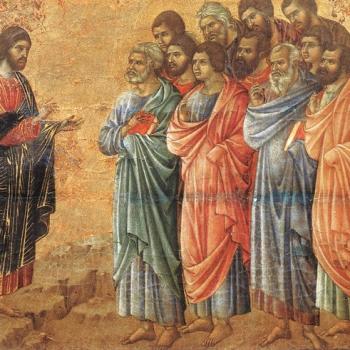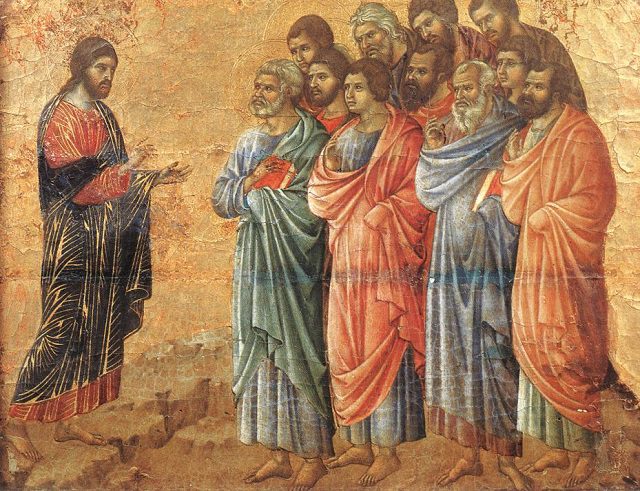
Atheist and anti-theist Bob Seidensticker runs the influential Cross Examined blog. He asked me there, on 8-11-18: “I’ve got 1000+ posts here attacking your worldview. You just going to let that stand? Or could you present a helpful new perspective that I’ve ignored on one or two of those posts?”
He also made a general statement on 6-22-17: “In this blog, I’ve responded to many Christian arguments . . . Christians’ arguments are easy to refute . . . I’ve heard the good stuff, and it’s not very good.” He added in the combox: “If I’ve misunderstood the Christian position or Christian arguments, point that out. Show me where I’ve mischaracterized them.” Such confusion would indeed be predictable, seeing that Bob himself admitted (2-13-16): “My study of the Bible has been haphazard, and I jump around based on whatever I’m researching at the moment.”
I’m always one to oblige people’s wishes if I am able, so I decided to do a series of posts in reply. It’s also been said, “be careful what you wish for.” If Bob responds to this post, and makes me aware of it, his reply will be added to the end along with my counter-reply. If you don’t see that, rest assured that he either hasn’t replied, or didn’t inform me that he did. But don’t hold your breath.
Bob (for the record) virtually begged and pleaded with me to dialogue with him in May 2018, via email. But by 10-3-18, his opinion was as follows: “Dave Armstrong . . . made it clear that a thoughtful intellectual conversation wasn’t his goal. . . . [I] have no interest in what he’s writing about.” Be that as it may, what is one to make (whatever he thinks of me) of his great (and perhaps in due course total) unwillingness to defend his ideas and opinions against my numerous serious critiques?
Bob’s words will be in blue. To find these posts, word-search “Seidensticker” on my atheist page or in my sidebar search (near the top).
*****
In his article, “How Reliable is Apostle Paul When He Knew Very Little About Jesus?” (12-17-12; rev. 9-4-15), Bob pontificated:
For being the founder of Christianity, Paul knew surprisingly little about Christ. . . .
Using the gospels as a guide, we’ll find that Paul is a shallow source of information.
If we were to extract biographical information from the gospels, we’d have a long list—the story of Jesus turning water into wine, walking on water, raising Lazarus, the Prodigal Son story, curing blindness with spit, odd events like his cursing the fig tree, and so on. But what information about Jesus do we get from Paul? . . .
No parables of the sheep and the goats, or the prodigal son, or the rich man and Lazarus, or the lost sheep, or the good Samaritan. In fact, no Jesus as teacher at all.
No driving out evil spirits, or healing the invalid at Bethesda, or cleansing the lepers, or raising Lazarus, or other healing miracles. As far as Paul tells us, Jesus performed no miracles at all.
No virgin birth, no Sermon on the Mount, no feeding the 5000, no public ministry, no women followers, no John the Baptist, no cleansing the temple, no final words, no Trinity, no hell, no Judas as betrayer (he mentions “the twelve”), and no Great Commission. Paul doesn’t even place Jesus within history—there’s nothing to connect Jesus with historical figures like Caesar Augustus, King Herod, or Pontius Pilate.
Perhaps everyone to whom Paul wrote his letters knew all this already? Okay, but presumably they already knew about the crucifixion, and Paul mentions that 13 times. And the resurrection, which Paul mentions 14 times.
This is an astonishingly clueless piece. Once again, the apologist tasked with responding to this sort of bilge (unfortunately, myself) feels like a mosquito on a nude beach: so many opportunities, but where to begin?! Well, here we go.
To take the last paragraph first: obviously Paul mentioned the crucifixion and resurrection a lot because they are absolutely central to the Christian gospel and our theology. That’s why he mentioned them more, even though his readers (being Christians) already knew about them. This ain’t rocket science, folks. But the Christians he was writing to also knew about the fine details of Jesus’ life; therefore, he didn’t need to repeat them. It wasn’t his primary purpose in his letters.
For supposedly knowing “surprisingly little about Christ,” Bob’s own article (in portions that I have not cited) notes many particulars about Paul’s writings, which seem to refute his own grandiose claims. After all, he lists fourteen separate aspects of Jesus and His life (complete with many biblical references) that even he concedes Paul knew about.
According to Strong’s Concordance: a standard biblical reference work, Paul mentions the word “Jesus” 218 times (an average of 2 1/2 times per chapter). In his epistles, he also mentions “Christ” (Greek for Messiah) apart from “Jesus” another 212 times. That’s 430 times total. I had to sit here and laboriously count up all the instances of “Christ” by itself, because an intelligent, educated man claims with a straight face that “Paul knew surprisingly little about Christ.”
Bob commits a glaring omission in not including the book of Acts (written by Luke) as data concerning what Paul knew and supposedly didn’t know about Jesus. It records many of his words, including sermons, and is basically devoted to his story, starting in chapter 13, till the last chapter (28). Thus, 57% of the book is about Paul (16 chapters out of 28); yet Bob didn’t think it was relevant in determining what Paul knew and taught about Jesus Christ. Go figure! And no, I refuse to spend more valuable time counting up Paul’s use of “Jesus” and “Christ” in Acts. Here’s the searchable Bible I use. Anyone can do it if they wish.
This is how ridiculous it gets in having to refute the ludicrous claims of atheists about the Bible and Christianity: and why very few are willing to do it. Who can blame them? It virtually takes the patience of Job. I’m half-disgusted at myself for doing this very paper, but I know it will do some good, and help some people inclined to believe Bob (or those who want to be able to refute these sorts of pseudo-“arguments”), and so I persevere. Please pray for me. Since prayer can be applied backwards in time (God being outside of time), I know that the prayers of some of you reading this will literally help me write it. Thanks!
Bob spends a great deal of energy listing various elements of the Gospel stories, and argues that it is odd that Paul (granting his conclusion for a moment) doesn’t include them. But why must we accept his premise in the first place? I see no compelling reason why. Protestant apologist Kyle Butt, in his excellent article, “Did Paul Write About Jesus as a Historical Person?” stated:
[Tom] Harpur’s major contention is that Paul did not mention details about Jesus’ life such as His birthplace in Bethlehem, His mother’s name, or His specific miracles. Yet, if the guiding hand of God produced the New Testament documents, it makes perfect sense that such information would not be repeated in Paul’s writings, since it was so thoroughly documented in Matthew, Mark, Luke, and John. In truth, the fact that Paul repeatedly alludes to Jesus in the flesh, but does not reiterate the various details of the gospel accounts, shows that Paul coincides with the Gospel writers, but was independent of them as well. Why would God need to record for the fifth time the various miracles and facts about Jesus’ life in the writings of Paul? Paul consistently dealt with many of the events in Jesus’ life such as His death, burial, resurrection, trial before Pilate, birth according to the seed of David, and the overarching fact that He took on the form of a human. Harpur’s complaint that Paul did not mention enough of the details that are recorded in the gospel accounts is a criterion that he and his fellow skeptics have arbitrarily chosen and that proves nothing. . . .
The obvious truth is that Paul saturated his writings with the name of Jesus and repeatedly stressed that Jesus had come in the flesh as a historical human being. The details he left out of his writings accord perfectly with what one would expect from divine inspiration, and show that, while he acknowledged the historical Jesus, his writings serve as testimony independent of the gospel accounts.
Catholic Ann Nafziger, in her piece, “If St. Paul’s Letters Are Older Than the Gospels, Why Does He Leave a Lot Out?” adds:
Because he was writing to specific audiences with particular issues in mind, it resulted in a less-than-systematic portrayal of Jesus’ life. For example, when writing to a church that he had founded, if there were no current controversies about the virgin birth or Jesus’ miracles, he wouldn’t have felt the need to address them.
The short answer is that the Gospels (four times!) already dealt with Jesus’ life in its fine details. Paul’s letters largely consist of systematic theology. They are the “theology” / “intellectual” portion of the New Testament: which is quite as necessary as the Gospels are. Different purpose; different content. It’s really as simple as that.
But beyond that basic consideration, in some of his claims regarding alleged Pauline “ignorance” Bob is factually wrong, as I will now proceed to show. Above, Bob wrote: “As far as Paul tells us, Jesus performed no miracles at all.” And later on in his post he elaborates:
Paul indirectly admits that he knew of no Jesus miracles:
Jews demand signs and Greeks look for wisdom, but we preach Christ crucified: a stumbling block to Jews and foolishness to Gentiles (1 Cor. 1:22–3)
Why “a stumbling block”? Jesus did lots of miraculous “signs”—why didn’t Paul convince the Jews with these? Paul apparently didn’t know any. The Jesus of Paul is not the miracle worker that we see in the Jesus of the gospels. . . .
The Jesus of Paul isn’t the Jesus of the gospels.
Bob refutes himself (a not uncommon occurrence), because he himself said that “Paul mentions” Jesus’ resurrection “14 times.” Is that not a miracle? Indeed, it is Jesus’ greatest miracle: the conquering of death, and showing that there is an afterlife. The Gospels teach that Jesus raised Himself (it was His own miracle), just as He had raised Lazarus:
John 2:18-22 (RSV) The Jews then said to him, “What sign have you to show us for doing this?” [19] Jesus answered them, “Destroy this temple, and in three days I will raise it up.” [20] The Jews then said, “It has taken forty-six years to build this temple, and will you raise it up in three days?” [21] But he spoke of the temple of his body. [22] When therefore he was raised from the dead, his disciples remembered that he had said this; and they believed the scripture and the word which Jesus had spoken.
John 10:17-18 . . . I lay down my life, that I may take it again. [18] No one takes it from me, but I lay it down of my own accord. I have power to lay it down, and I have power to take it again . . .
Note that Jesus thought His resurrection was the “sign” that the Jews demanded (2:18). He reiterates this elsewhere in comparing His resurrection to the “sign of Jonah” (Mt 16:1-4; Lk 11:29-30): that is, his emerging from the whale (metaphor for His tomb) after three days. Bob’s citing of 1 Corinthians 1:22-23 proves nothing that he claims. Paul’s simply saying that the crucifixion was loathsome to the Jews, and made it harder for them to accept Christianity. There is no hint that “he knew of no Jesus miracles:”. It’s ludicrous. In the same book he mentions the resurrection of Jesus nine times: in 6:14 and eight more times in chapter 15.
Moreover, when Paul recalls the story of his conversion to Christ, he mentions miraculous occurrences caused by “Jesus of Nazareth” (Acts 22:8): namely, “a great light from heaven” (22:6, 11), “brighter than the sun” (26:13), and “a voice” [of Jesus] from heaven (22:7; 26:14), which the others around him couldn’t hear (22:9). That’s all miraculous, supernatural stuff (I think even Bob would agree). It’s a “heavenly vision” (26:19).
Bob claims there is “no Trinity” in Paul’s writing. This is absolutely absurd. See my papers on the Deity of Jesus and The Holy Trinity: filled with hundreds of biblical proofs (including scores of them in Paul’s writing).
He claims that there is “no John the Baptist” either. But Paul does in fact mention him, in an evangelistic sermon delivered at Antioch of Pisid’ia:
Acts 13:24-25 Before his coming John had preached a baptism of repentance to all the people of Israel. [25] And as John was finishing his course, he said, `What do you suppose that I am? I am not he. No, but after me one is coming, the sandals of whose feet I am not worthy to untie.’
Bob claims that there is “no hell” in Paul’s writings. He doesn’t use the word, but he repeatedly teaches the concept, some eleven times, as one article on the topic documents, referring to God’s “wrath and fury” towards the unrepentant (Rom 2:8), “wrath of God” (Col 3:6), “tribulation and distress for every human being who does evil” (Rom 2:9), “punishment of eternal destruction and exclusion from the presence of the Lord ” (2 Thess 1:9). “Destruction” here doesn’t mean “annihilation”: as the article explains.
Bob claims: “Paul doesn’t even place Jesus within history—there’s nothing to connect Jesus with historical figures like . . . Pontius Pilate.” Wrong again! (does anyone see a pattern here?):
Acts 13:27-29 For those who live in Jerusalem and their rulers, because they did not recognize him nor understand the utterances of the prophets which are read every sabbath, fulfilled these by condemning him. [28] Though they could charge him with nothing deserving death, yet they asked Pilate to have him killed. [29] And when they had fulfilled all that was written of him, they took him down from the tree, and laid him in a tomb.
1 Timothy 6:13 In the presence of God who gives life to all things, and of Christ Jesus who in his testimony before Pontius Pilate made the good confession, [Bob cites this, too, but he thinks the letter wasn’t written by Paul]
Bob thinks Paul has no knowledge of “Judas as betrayer” either. But he is in error again. Paul certainly refers to him here:
1 Corinthians 11:23 For I received from the Lord what I also delivered to you, that the Lord Jesus on the night when he was betrayed took bread,
Since Bob himself cited this verse, who does he believe Paul thinks was the one who betrayed Jesus? Not that logical consistency is a very common trait in Bob’s anti-Bible rantings . . .
Bob also argues that because Paul referred to the disciples as “the twelve” (1 Cor 15:5) at the time Jesus appeared to them after His resurrection, therefore he wasn’t aware of Judas’ death, that decreased the group to eleven. But this is an example of non-literal biblical usage again. As an analogy: in Genesis 42:13, the children of Jacob said they were the “twelve brothers” even though they thought that Joseph (the 12th) was dead, leaving eleven.
It appears fairly plausible, if not certain, that “the twelve” (without “disciples” added) had become a title for the group of men that were Jesus’ disciples and closest companions (see, e.g., Mt 26:14, 47; Mk 4:10; 6:7; 9:35; 10:32; 11:11; 14:10, 17, 20, 43; Lk 8:1; 9:1, 12; 18:31; 22:3, 47; Jn 6:67, 71; 20:24; Acts 6:2). Jesus clearly uses it as a title, in this way: “Did I not choose you, the twelve . . .?” (Jn 6:70). The number twelve also had great meaning in Hebrew thought, as many biblical examples show.
Lastly, we use numbers in a non-literal fashion in the same way today. So, for example, there is the Big Ten Conference in college football (with our two beloved Michigan teams), which actually has fourteen members. It had ten from 1912 to 1950 (when Michigan State was added), eleven from then till 2011, when it became twelve, and 14 after 2014. From 2011 to 2014, the Big Ten had twelve teams, and the Big 12 consisted of ten teams!
We also use the term “two-by-four” for the common piece of lumber, when in fact, its actual dimensions are 1 5/8 inches by 3 5/8 inches. If such non-literal numbers can be used by us, why not also in the Bible? What forbids it? As with virtually all of these alleged “biblical contradictions” I’ve ever seen, they turn out to be nonexistent. Why isn’t Bob out there also running down the Big Ten for “lying” about the number of their teams?
Bob writes: “Not confirmed: There is no confirmation of the post-resurrection appearances in Paul’s epistles.” Bob stumbles upon the truth here (like the unplugged clock, twice a day). But this theme is present in one of his sermons: the one given at Antioch of Pisid’ia, which I now cite for the third time:
Acts 13:30-31 But God raised him from the dead; [31] and for many days he appeared to those who came up with him from Galilee to Jerusalem, who are now his witnesses to the people.
What would Paul have said about the philosophical issues that divided the church for centuries? These don’t mean much to most of us today because they’ve long been decided, but they were divisive in their day—whether Jesus was subordinate to God or not, whether Jesus had a human body or not, whether he had a human nature or not, whether he had two wills or not, whether the Holy Spirit was part of the Godhead, and so on. No one knows how Paul would have resolved them or even if they crossed his mind.
Kyle Butt observes:
Is it true that Paul . . . never referred to Him as a flesh and blood human being? Certainly not. . . .
Not only did Paul repeatedly mention Jesus, but he specifically stressed that Jesus had come in the flesh as a real human being. For instance, in 1 Timothy 2:5, Paul wrote: “For there is one God and one Mediator between God and men, the Man Christ Jesus.” To elucidate what he meant by the word “man,” Paul wrote in Philippians 2:5:
Let this mind be in you which was also in Christ Jesus, who, being in the form of God, did not consider it robbery to be equal with God, but made Himself of no reputation, taking the form of a servant, and coming in the likeness of men. And being found in appearance as a man, He humbled Himself and became obedient to the point of death, even the death of the cross (emp. added).
Any attempt to turn Paul’s phrase “in the likeness of men” into some sort of spiritual, mystical appearance is doomed to failure. Furthermore, Paul more specifically mentioned that “the likeness of men” that he discussed in Philippians meant human flesh. Paul wrote to the Romans about “Jesus Christ our Lord, who was born of the seed of David according to the flesh” (Romans 1:3, emp. added).
There are many other indications as well; for example:
Acts 20:28 Take heed to yourselves and to all the flock, in which the Holy Spirit has made you overseers, to care for the church of God which he obtained with the blood of his own Son. [hard to have “blood” and not be a man]
Colossians 2:8-9 See to it that no one makes a prey of you by philosophy and empty deceit, according to human tradition, according to the elemental spirits of the universe, and not according to Christ. [9] For in him the whole fulness of deity dwells bodily,
1 Timothy 3:16 Great indeed, we confess, is the mystery of our religion: He was manifested in the flesh, vindicated in the Spirit, seen by angels, preached among the nations, believed on in the world, taken up in glory.
It’s also difficult for a spirit being with no body to be crucified. Bob himself says that Paul mentions Jesus’ crucifixion 13 times. I’ll take his word on that; thus, it is 13 times that he refutes his own vapid inanity about Paul not being sure if Jesus had a body or not. For that matter, a spirit can’t be “raised from the dead.” That presupposes a physical body that died and is now back alive. Bob says Paul mentions Jesus’ resurrection 14 times, so he refutes one clueless point of his 27 times. Not bad! Saves me a lot of work . . .
As to Jesus’ two wills, that is mostly covered in the Gospels, as I have documented, but Paul also makes statements that are consistent with the orthodox Christian understanding (two wills: divine and human).
Jesus being “subordinate” to or in subjection or submission to God the Father poses no problem at all for His deity or for trinitarianism, as Protestant apologist Glenn Miller explains, in extreme (but wonderful!) depth: as is his wont. This aspect as well as the two natures of Christ (also mentioned in Bob’s laundry list above) are strikingly highlighted in this Pauline passage:
Philippians 2:5-8 Have this mind among yourselves, which is yours in Christ Jesus, [6] who, though he was in the form of God, did not count equality with God a thing to be grasped, [7] but emptied himself, taking the form of a servant, being born in the likeness of men. [8] And being found in human form he humbled himself and became obedient unto death, even death on a cross.
It’s patently ridiculous to suggest that there is nothing in Paul to suggest his opinions on either of these doctrines. This paper is long enough, Bob has already been refuted over and over (and easily so), and the patience I asked readers to pray for is barely hanging by a thread about now. But we’ll do one last refutation (and it’s a decisive one indeed, if I do say so):
What would Paul have said about . . . whether the Holy Spirit was part of the Godhead, . . . No one knows . . . if [it even] crossed his mind.
Really? Paul cites an Old Testament prophecy (Isaiah 6:8-10) in Acts 28:25-27, but with one important language difference. The Old Testament passage says that “I heard the voice of the Lord saying . . .” (Is 6:8). But when Paul cites it, he introduces it as follows: “The Holy Spirit was right in saying to your fathers through Isaiah the prophet” (Acts 28:25). This is a direct (logical) unarguable equation of the Holy Spirit with God. Thus, the question did indeed cross Paul’s mind, and he rendered a definite opinion on it. He makes the same equation in the following passages:
1 Corinthians 3:16-17 Do you not know that you are God’s temple and that God’s Spirit dwells in you? [17] If any one destroys God’s temple, God will destroy him. For God’s temple is holy, and that temple you are. (cf. 6:19; 2 Cor 6:16)
1 Corinthians 12:4-6, 11 Now there are varieties of gifts, but the same Spirit; [5] and there are varieties of service, but the same Lord; [6] and there are varieties of working, but it is the same God who inspires them all in every one. . . . [11] All these are inspired by one and the same Spirit, who apportions to each one individually as he wills.
2 Corinthians 3:16-17 Now the Lord is the Spirit, and where the Spirit of the Lord is, there is freedom. [18] And we all, with unveiled face, beholding the glory of the Lord, are being changed into his likeness from one degree of glory to another; for this comes from the Lord who is the Spirit.
I guess Bob, in his exhaustive Bible study, undertaken with the utmost seriousness and intellectual honesty (and particular attention to fine detail) managed to somehow miss all of this biblical information that I found. Anyone can accept it if a man admits to being ignorant about a given subject. We all have thousands of topics we’re unacquainted with. But to claim to be an expert on the Bible and Christian theology, and condescendingly mock millions of Christians — who clearly know exponentially more about these theological topics than Bob does –, is insufferable folly.
***
Photo credit: Orthodox icon of St. Paul’s conversion, photographed by Ted (3-9-11) [Flickr / CC BY-SA 2.0 license]
***



























